The rise and fall of associationism: The Yaoundé and Lomé conventions
The rise and fall of associationism: The Yaoundé and Lomé conventions
Author(s): Gerard McCannSubject(s): Politics
Published by: Szkoła Główna Handlowa w Warszawie
Keywords: associationism; Yaoundé and Lomé conventions; colonalism; international cooperation policies
Summary/Abstract: The immediate post-colonial period offered opportunities as well as formidable challengesfor former colonies of European powers. While colonial mentalities still pervadedin many European capitals and paternalism remained pervasive throughout the politicaldiplomacy of the period, other perspectives were emerging. Through innovative policyengagements that occurred in the late 1950s and into the 1960s, a new sense of transnationalpurpose could be seen which presented former colonies with partnership optionsthat were seemingly and practically outside the context of the historic geo-economic imposition.Whereas some European powers continued to exert overly dismissive attitudesto African engagement and society, other approaches experimented with developmentalpolicies that were lauded by both sides at the time. This article will look at the practice andpolicies of associationism – the outworking of the Yaoundé and Lomé agreements – andwill look at the formative international cooperation policies of the European Community(EC), as it evolved through the period when former European colonies were attainingindependence. Finally, it will survey the reasons for the demise of associationism andspeculate on the onset of what some have described as “neo-colonalism” (Langan, 2018:1–32; Nkrumah, 1965)
Journal: Studia z Polityki Publicznej
- Issue Year: 27/2020
- Issue No: 3
- Page Range: 9-29
- Page Count: 21
- Language: English

